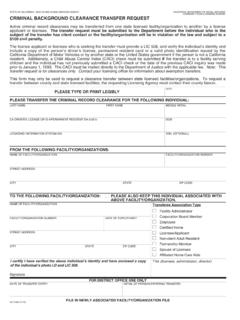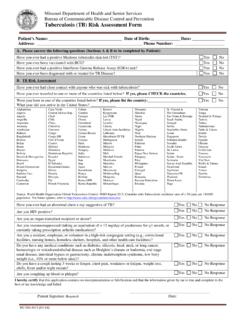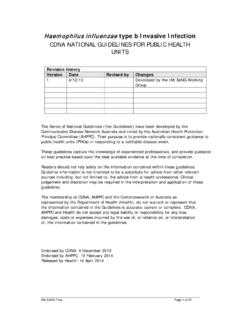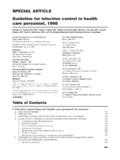Transcription of HOW TO RECEIVE AND MAINTAIN YOUR - The Salt Lake …
1 ALCOHOL CONSUMPTION ALLEGIANCE TO THE UNITED STATES. DRUG INVOLVEMENT. FINANCIAL CONSIDERATIONS PROTECTED. HANDLING. PSYCHOLOGICAL CONDITIONS DUE PROCESS INFORMATION. CONDUCT. CRIMINAL. FOREIGN INFLUENCE. FOREIGN PREFERENCE SENSITIVE DUTIES SECURITY. clearance . USE OF IT SYSTEMS OUTSIDE. ACTIVITIES. BEHAVIOR. SEXUAL. CONTINUING. RESPONSIBILITY. CONTACTS. CLASSIFIED INFORMATION. SELF-REPORTING. PERSONAL. PERSONAL CONDUCT. DEFENSE SECURITY SERVICE. AND MAINTAIN your . SECURITY clearance . HOW TO RECEIVE . So you need a Security ADJUDICATIVE GUIDELINES.
2 OBLIGATIONS. Receiving &. Maintaining your INTRODUCTION Security clearance Getting Whenever a Department of Defense employee or contractor requires access to clearance classified national security information, the individual must be granted a security Eligibility clearance at the proper level to access that information. A security clearance is a determination that a person is able and willing to safeguard classified national security information. The three security clearance levels are: Confidential, Secret, and Top Secret. Adjudicative Guidelines A prerequisite for accessing classified national security information is completion and favorable adjudication of a background investigation.
3 The investigation is noncriminal and covers a defined period of normally no more Due than the last 10 years. The information collected must be sufficient to allow an Process affirmative or negative determination of a person's eligibility for access to classified information and suitability for employment. The adjudicative process is the careful weighing of a number of variables known as Continuous the whole person concept. Available, reliable information about the individual, past Evaluation and present, favorable and unfavorable, is considered in reaching a determination of eligibility.
4 Eligibility for access is granted only where facts and circumstances indicate that access to classified information is consistent with the national security interests of the United States. Obligations Personal Conduct Self- Reporting Reporting Responsi- bilities Security Issues Potential Security Concerns 2 Continuing Responsibility Receiving &. Maintaining your TABLE OF CONTENTS Security clearance Getting RECEIVING AND MAINTAINING your SECURITY 4. WHAT IS A SECURITY clearance ?.. 4. clearance WHAT IS CLASSIFIED INFORMATION ? .. 4 Eligibility WHAT ARE SENSITIVE DUTIES ?
5 4. WHY DO WE NEED CLEARANCES AND FAVORABLE PUBLIC TRUST DETERMINATIONS?.. 4. HOW DO I GET A SECURITY clearance OR POSITION OF TRUST DETERMINATION?..5 Adjudicative GETTING clearance 6. Guidelines ONCE I GET MY clearance ELIGIBILITY, CAN I SEE ALL CLASSIFIED INFORMATION?.. 6. HOW MUCH PERSONAL INFORMATION DO I NEED TO PROVIDE?.. 6. ARE THERE ANY HELPFUL TIPS FOR FILLING OUT THE QUESTIONNARE?.. 6. WHAT BACKGROUND AREAS ARE CHECKED?.. 7 Due Process ADJUICATIVE 7. HOW IS THE SECURITY DETERMINATION MADE?.. 7. WHAT ARE ADJUDICATIVE GUIDELINES ?
6 7. DUE 8 Continuous HOW LONG DOES THE clearance PROCESS TAKE?.. 8 Evaluation CONTINUOUS 9. SO, IS THAT ALL THERE IS?.. 9. 9. NOW THAT I HAVE MY SECURITY clearance , WHAT ARE MY OBLIGATIONS?.. 9 Obligations PERSONAL 9. 10. SELF-REPORTING OF PERSONAL 10 Personal Conduct REPORTING 11. SECURITY 11. POTENTIAL SECURITY 12. BEHAVIORS THAT ARE POTENTIAL SECURITY 12. Self- ALCOHOL 12 Reporting ALLEGIANCE TO THE UNITED 13. CRIMINAL 13. DRUG 13. FINANCIAL 13 Reporting PSYCHOLOGICAL 14 Responsi- FOREIGN 14 bilities FOREIGN 15. USE OF INFORMATION TECHNOLOGY 15.
7 OUTSIDE 15. PERSONAL 15 Security HANDLING PROTECTED 16 Issues SEXUAL 16. your SECURITY clearance IS A CONTINUING 16. Potential Security Concerns 3 Continuing Responsibility Receiving &. Maintaining your RECEIVING AND MAINTAINING Security clearance your SECURITY clearance . Getting clearance Eligibility WHAT IS A A security clearance is a determination that you are eligible for access to classified SECURITY information and eligible to perform sensitive duties. clearance ? Not everyone qualifies for a security clearance or occupancy of a sensitive position.
8 Adjudicative only those people determined to be good security risks are given clearances and Guidelines permitted to handle classified information or perform sensitive duties. The purpose of a security clearance is to determine whether you are able and willing to safeguard classified national security information or perform sensitive Due duties, based on your loyalty, character, trustworthiness, and reliability. Process WHAT IS Classified information is official information or material that requires protection in Continuous the national interest.
9 Evaluation CLASSIFIED. INFORMATION ? Classified information is national security information, which means that it relates to the national defense and foreign relations of the United States. WHAT ARE If classified information is mishandled or given to the wrong person, it could harm Obligations SENSITIVE our country's security or that of our allies. DUTIES ? Sensitive duties are those duties which, although they do not include access to classified information, if performed by an untrustworthy individual, could cause harm to the national security.
10 Some examples of sensitive duties include access Personal to restricted areas, access to sensitive DoD equipment, or information technology Conduct (IT) positions where the individual works with unclassified automated information systems. Positions involving sensitive duties, with no access to classified information, are known as positions of trust. Self- Reporting WHY DO We need clearances to ensure that only trustworthy people have access to classified and sensitive information. Common sense and personal experience tell us that not WE NEED all people are equally trustworthy.





